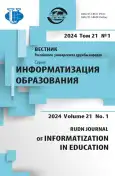Инклюзивное образование в высшей школе России и Китая: формирование условий в цифровой среде для работы с лабораторным оборудованием лиц с ограниченными возможностями здоровья
- Авторы: Добромиров Д.Д.1, У Ж.2
-
Учреждения:
- Российский университет дружбы народов
- Юго-Восточный университет
- Выпуск: Том 21, № 1 (2024)
- Страницы: 114-124
- Раздел: ЦИФРОВЫЕ ТЕХНОЛОГИИ В ИНКЛЮЗИВНОМ ОБРАЗОВАНИИ
- URL: https://journal-vniispk.ru/2312-8631/article/view/321380
- DOI: https://doi.org/10.22363/2312-8631-2024-21-1-114-124
- EDN: https://elibrary.ru/QDFXYY
- ID: 321380
Цитировать
Полный текст
Аннотация
Постановка проблемы. Образование занимает неотъемлемую часть культурного и профессионального развития человека. В этом отношении задачи, связанные с обеспечением доступности процесса обучения и в то же время поддержания высокого уровня качества образования, являются на сегодняшний день актуальными. Терминологически инклюзивное образование охватывает широкий спектр проблем, однако ключевым является вопрос доступности образования для различных социальных групп. Приоритетная задача исследования определена в плоскости выявления условий работы для лиц с ограниченными возможностями здоровья (ОВЗ), обучающихся в вузах на естественно-технических направлениях, с лабораторным оборудованием ввиду исключительной важности лабораторных практикумов в системе профессиональной подготовки будущих специалистов. Обосновывается целевое использование цифровых технологий в образовательном процессе, в частности при организации работы лиц с ОВЗ в контексте выполнения ими лабораторных практикумов. Методология. Методом количественного и статистического анализа обозначена актуальность поиска системных решений, определяющих доступную образовательную среду для лиц с ОВЗ в системе профессиональной подготовки будущих специалистов естественно-технических профилей. Предложена теоретическая модель организации доступности образовательного процесса в рамках выполнения лабораторных практикумов лицами с ОВЗ в цифровой среде. Результаты. Разработана теоретическая модель инклюзивного образования в высшей школе Российской Федерации и Китайской Народной Республики для организации аналоговой реализации лабораторных практикумов лицами с ОВЗ в цифровой образовательной среде. Выявлена необходимость интеграции цифровых инструментов в образовательный процесс, требующий системную подготовку лиц с ОВЗ по естественно-техническим направлениям, включающим в содержании своих учебных планов проведение лабораторных практикумов. Ключевое значение в подборе и дальнейшем внедрении цифровых технологий в образовательный процесс в плоскости создания условий работы с лабораторным оборудованием определено вокруг индивидуальных потребностей студентов, имеющих ограниченные возможности здоровья. Заключение. Обоснована актуальность и прикладная значимость теоретической модели вариативной цифровой среды, а также выработан перечень рекомендаций к использованию такой модели с точки зрения ее целевой ориентации на доступность образовательного процесса для студентов, имеющих особенности здоровья и обучающихся по направлениям естественно-технических профилей подготовки.
Об авторах
Даниил Денисович Добромиров
Российский университет дружбы народов
Автор, ответственный за переписку.
Email: dobromirov-dd@rudn.ru
ORCID iD: 0000-0001-7981-8873
аспирант, кафедра сравнительной образовательной политики
Российская Федерация, 117198, Москва, ул. Миклухо-Маклая, д. 6Жунвэй У
Юго-Восточный университет
Email: 1042205166@rudn.ru
ORCID iD: 0009-0007-4006-1288
ассистент преподавателя, институт образования
кампус Цзюлун, Китайская Народная Республика, 211189, Нанкин, р-н Цзяннин, Юго-Восточная университетская дорога, д. 2Список литературы
- Anabel М, López-Gavira R, Morgado B. How do Spanish disability support offices contribute to inclusive education in the university. Disability & Society. 2017;32(10): 1608-1626. https://doi.org/10.1080/09687599.2017.1361812
- Leake DW, Stodden RA. Higher education and disability: past and future of underrepresented populations. Journal of Postsecondary Education and Disability. 2014;27(4): 399-408.
- Odincova MA, Radchikova NP. Self-activation as a personal resource of students in inclusive educational environment of higher education institution. Modern Foreign Psychology. 2018;7(1):62-70. (In Russ.) https://doi.org/10.17759/jmfp.2018070107
- Levshunova ZhA, Basalaeva NV, Kazakova TV. Inclusive education. Krasnoyarsk: Siberian Federal University; 2017. (In Russ.)
- Chernikova LP. Russian Chinese relations: history and modernity. Problems of Oriental Studies. 2015;(2):42-47. (In Russ.)
- Yan C, Han V. Contemporary Russian-Chinese relations and their impact on forcing a new world order. Vladivostok: Far Eastern Federal University Publishing House; 2022. (In Russ.) https://doi.org/10.24866/7444-5327-5
- Froumin I, Ruoqi C. Russia, China, and Central Asia in higher education. In: Marijk van der W, Marginson S, Nian CL, Kirby W. (eds.) China and Europe on the New Silk Road: Connecting Universities Across Eurasia. Oxford: Oxford University Press; 2020. https://doi.org/10.1093/oso/9780198853022.003.0020
- Charlene T, Catherine SKCh. Education policy borrowing in China: has the West wind overpowered the East wind? A Journal of Comparative and International Education. 2015;45(5):686-704. https://doi.org/10.1080/03057925.2013.871397
- Crowley-Vigneau A, Baykov AА, Kalyuzhnova Ye. Implementation of international norms in Russia: the case of higher education. Higher Education in Russia. 2020; 29(8-9):39-54. (In Russ.) https://doi.org/10.31992/0869-3617-2020-29-8-9-39-54
- Verbickij AA. Emergence of a new educational paradigm in Russian education. Education and Science. 2012;6(95):5-18. (In Russ.) https://doi.org/10.17853/1994-5639-2012-6-5-18
- Yiming Zh. New national initiatives of modernizing education in China. ECNU Review of Education. 2019;2(3):353-362. https://doi.org/10.1177/2096531119868069
- Cvenger IG, Cvenger YuV. The concept of realization of laboratory practical training in a modern technical university. Bulletin of Kazan Technological University. 2012; 15(22):210-213. (In Russ.)
- Grinberg GM, Romanov DV. Organization of a laboratory workshop using information and communication technologies. Reshetnev Readings. 2014;18:290-295. (In Russ.)
- Grishaeva S, Kolosova O, Kulikova O. Inclusive education in Russia. In: Mantulenko V. (ed.) Global Challenges and Prospects of the Modern Economic Development. 2019;57:885-892. https://doi.org/10.15405/epsbs.2019.03.88
- Yuexin Zh, Rosen S, Li Ch, Li J. Inclusive higher education for students with disabilities in China: What do the university teachers think? Higher Education Studies. 2018; 8(4):104-115. https://doi.org/10.5539/hes.v8n4p104
- Polyanskaya AG, Boronina LN. Inclusive education in higher education: assessment of status and prospects for development. Strategies for the Development of Social Communities, Institutions and Territories: Proceedings of the IX International Scientific and Practical Conference, 17-18 April 2023 (vol. 2). Yekaterinburg; 2023. p. 28-31. (In Russ.) Available from: https://elar.urfu.ru/handle/10995/126936 (accessed: 06.12.2023).
Дополнительные файлы









